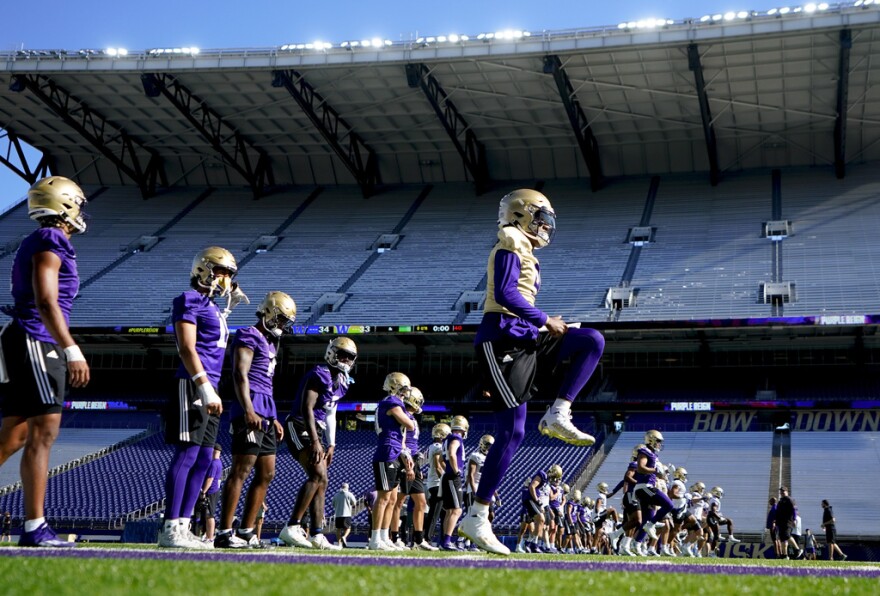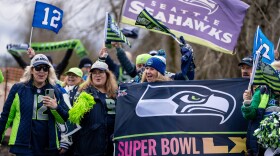Who wins and who loses with the University of Washington leaving the Pac-12 Conference for the Big Ten?
For some insight into how the move impacts UW athletes and the future of the Apple Cup, we turned to sports writer Christian Caple. He writes about UW football for his subscription newsletter On Montlake and he's the co-host of the podcast Say Who, Say Pod.
Click "Listen" above to hear Caple's conversation with KNKX Morning Edition host Kirsten Kendrick.
Transcript
Note: This transcript is provided for reference only and may contain typos. Please confirm accuracy before quoting.
KNKX Morning Edition host Kirsten Kendrick: Christian, thanks for coming in to talk about this.
On Montlake writer Christian Caple: Yeah. Thanks for having me.
Kendrick: So this affects all sports at UW. And for folks who don't follow this super closely. Can you start by explaining exactly what happened on Friday?
Caple: Yeah, so to explain what happened on Friday, we actually need to go back to June 30, 2022. That was the day that out of nowhere, USC and UCLA dropped a bombshell on college athletics that they were leaving the Pac-12 for the Big 10, effective summer of 2024.
And ever since then, there has been speculation about what that was going to mean for the future of the Pac-12. So, in a way, you could have predicted the day UCLA and USC left that the end game for the Pac-12 was something like this. But it all came together on a really frantic Friday morning in a way, that was kind of out of Hollywood, a little bit.
Ultimately, it was Washington and Oregon who informed their peer schools in the Pac-12 that they were going to accept a deal with the Big 10, rather than try to stay together and and sign a grant of rights for the media rights deal that the Pac-12 had put in front of them, that was all streaming and through Apple TV, and a lot of schools had a lot of reservations with it. But Friday's events were about 13 or 14 months in the making.
Kendrick: And underneath all this I understand there's been a lot of criticism of Pac-12 commissioners, including one in particular, can you give us a little background on that?
Caple: Yeah, so while it's true that the current Commissioner George Kliavkoff presided over the demise of the Pac-12 as we know it, years from now, when people look back on what led to the downfall of the Pac-12. And if you ask those folks who the person at the top of that list should be, you're gonna hear: Larry Scott, Larry Scott, Larry Scott.
Larry Scott was the commissioner of the Pac-12 for more than a decade. He was the commissioner, in fact, who expanded the league from the Pac-10 to the Pac-12, adding Colorado and Utah in 2011. And he billed himself as an innovator and his biggest innovation wound up being the biggest albatross that weighed this conference down and that was the Pac-12 Networks. If you follow the league, you know, if you have DIRECTV, you don't have the Pac-12 Network because the satellite giant never picked it up. That wound up kind of being a punch line for a long time.
And you can trace the roots of USC and UCLA leaving for the Big 10 to the conferences sort of deterioration under Larry Scott, when the league just wasn't as competitive on the field. Maybe USC in particular felt like being the big flagship program in the big market in Los Angeles. They weren't treated like number one by the conference office. And that led to them leaving a year into George Kliavkoff's tenure.
The media rights saga, this current cycle, there were plenty of missteps and plenty of gaffes by Kliavkof and certainly, you know, when when the when the book so to speak, if it's actually a book or just a metaphorical book of people recalling the downfall of the Pac-12 comes to be written, George Kliavkoff had a role in it. But I don't know that you'd find anyone who would would disagree with the notion that Larry Scott is on the list of folks who led to the Pac-12's demise.
Kendrick: So with UW joining the big 10. What does this mean for current UW athletes? And what does it mean for athletes considering playing for the university?
Caple: Yeah, I think from a football perspective, which is the lens through which everybody sort of looks at these moves, it won't have a huge impact.
You know, there's 12 regular season football games a year and seven of them are played on the school's home campus. So you're talking about five road trips on charter flights. So I think, from a recruiting standpoint, it is beneficial for the football program, because now they can tell kids who are on the West Coast, but maybe felt like they needed to leave the West Coast to play in one of the two premier conferences, the Big 10 or the SEC. Well, guess what, you can do that at the University of Washington now, because Washington is going to be in the Big 10.
For every other sport, their lives just got harder, or will be harder when when this move is made next summer. They're going to have to play road games instead of in Tempe, and Tucson, and Boulder, and Salt Lake City, and the Bay Area, they're now going to have to occasionally travel to Piscataway, New Jersey to play against Rutgers, to go play against Maryland. They're going to have to travel to Michigan and to Ohio and that's a long plane trip.
So maybe the the new revenue from the Big 10 deal gives them the opportunity to charter more travel for sports teams that traditionally travel commercially, but I can't imagine they're going to be able to do that for everybody. So you know, some of those commercial flights are going to be really long, are going to require layovers, are going to require more miss class time. I think you've seen on social media, some athletes from sports that are not football kind of point out that, you know, 'hey, I signed up to play in the Pac-12. I wanted to play on the West Coast. My family wanted me to be on the West Coast. I'm not really too pleased about this move.'
Kendrick: Yeah, that's what I've been seeing a lot of as well. And then a lot of other social media comments are speaking to the UW vs. Washington State University rivalry, will that be impacted by this move?
Caple: Yeah, absolutely. You know, if you love the Apple Cup, and you want the Apple Cup to continue being played, the best case scenario would have it being played in September, I would imagine, because it's not going to be a conference game anymore. It's not going to be over Thanksgiving weekend, it's not going to be the regular season finale for Washington and Washington State like it has been, with only a few exceptions for decades.
Washington has been clear that it absolutely wants to continue playing the Apple Cup. It absolutely wants to continue playing Washington State across all sports. But it's not as simple as wanting to.
First of all, there are going to be some feelings involved. And rightfully so, because Washington State is now one of four teams that's left behind in what's left of the Pac-12. And their athletics future is entirely uncertain. Wherever they go, is their share of the conference's media rights distribution going to be enough to continue funding and staffing the athletic department at the level that they have been for years? And it's hard to see a path toward that. So until they can figure those sorts of things out, such that they can be figured out, I don't know that resolving the Apple Cup is a huge priority for Washington State.
Regardless, I can't imagine they would want to play that game, unless it's going to be a true home and home alternating between Seattle and Pullman every year like it has been for a long time, and that it's financially viable for them as well. But I've heard from and spoken to a lot of WSU fans who don't ever want to see Washington again and based on the position that this has put Washington State in, you can't really blame them.







